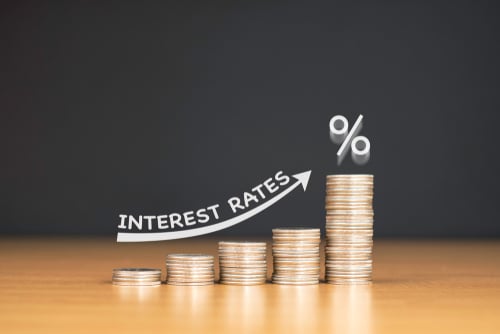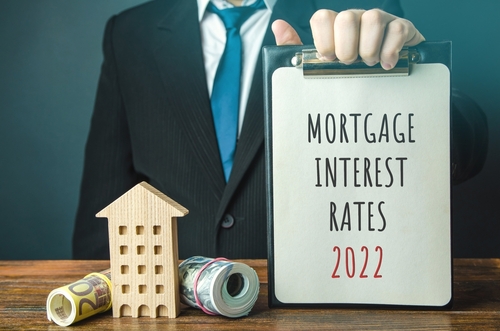In an effort to steady the market currently experiencing an increase in prices of food, gas, and homes, the Federal Reserve increased the interest rate by 0.25% in March of this year. Since then, there have been more increases, resulting in a range of 1.50% to 1.75% increase–and it’s not stopping there. But, what does this mean for landlords, and what can they do in response to the interest rate hike? Keep reading as we review the latest news and how it impacts landlords.

Latest News Regarding Interest Rate Hikes
Currently, inflation is extremely high in the United States. In fact, it’s higher than it’s been in 40 years, reaching 8.6% in May. As a result, the Federal Reserve is working to increase interest rates to slow down rapidly-increasing inflation.
The latest interest rate hike happened following the Federal Reserve’s June 14-15 meeting, which raised rates by 0.75 percentage points. As a result, this bumped the federal funds rate to a range of 1.50% to 1.75%. This decision follows a similar increase of 50 basis points in May.
Hitting 3.48% in June, the 10-year Treasury Bond is at its highest level in 11 years. So how will the Federal Reserve react to increasing inflation?
Are More Increases Coming?
Unfortunately, the increases aren’t necessarily slowing down or stopping any time soon. In fact, they expect to have at least several more hikes continuing until the end of the year.
Another rise is expected this month, bringing the total increase for this year to 2.00 to 2.25 percentage points. But what does this mean for landlords? Here are some of the pros and cons of the interest rate hike for landlords.
What Does the Interest Rate Hike Mean for Landlords?
If you’re a landlord, you will most likely be impacted by interest rate hikes. For one, it’s important to recognize that you can make more money from your rental units with higher interest rates. However, there are several downsides that go along with interest rate hikes. Here are the main considerations for landlords.

- Mortgages are More Expensive
- Higher Credit Card Bills
- Reduced Amount of Savings
Mortgages are More Expensive
With a rise in the federal interest rate, banks have a higher cost of credit. That said, the higher rates are passed on to consumers who want to take out large loans, such as mortgages. In turn, this highly impacts landlords or business owners looking to purchase properties.
Mortgage rates are expected to rise, making it much more expensive for landlords to buy new properties or refinance their current loans. Additionally, home prices are steadily rising alongside mortgage rates. Thus, making it difficult for potential homebuyers or landlords to purchase properties.
Higher Credit Card Bills
Many landlords and business owners use credit cards for business purposes or for everyday purchases. Some credit card companies change their interest rates based on the prime rate, which is closely related to the federal funds rate.
As such, variable-rate credit card interest rates will rise as well. So, if you currently have credit card debt, it’s best to pay it off as quickly as possible to avoid higher interest rate charges. Unfortunately, if you have an outstanding balance on your credit cards, you’ll experience higher interest costs.
Reduced Savings
With rapidly rising interest rates, that means banks will offer higher returns on their savings accounts. So although it doesn’t influence the deposit rate for savings accounts, the federal interest rate indirectly affects it.
With a higher interest rate, people would likely leave their money in the bank to earn interest. That means banks will probably have to offer higher rates to keep people from withdrawing money. However, with high inflation, the money you make on a savings account won’t have the purchasing power it did when you initially deposited it.
Tips for Withstanding Interest Rate Changes
Needless to say, rising interest rates and inflation majorly affect landlords, investors, and most people in general. Unfortunately, as inflation rises, the Fed continues to increase interest rates to combat it. So, that means landlords must be careful of how they spend their money and handle finances.
However, landlords can do a few things to stay proactive and navigate interest rate changes this year. For instance, work with your property managers in Baltimore to get an idea of your finances for each property. Additionally, here are a few tips for withstanding rising rates.
- Work to Improve Credit
- Consider Refinancing
- Use a Home Equity Loan
Work to Improve Credit
One way to lower mortgage payments is by improving your credit score. After all, the higher your credit score, the lower the interest rate you’ll get for your mortgage. So, even if you’re not looking to buy property any time soon, it’s still a good idea to improve your credit score. That way, you’ll have an easier time obtaining a mortgage loan later on.

Additionally, if you’re looking for a loan, look for an adjustable-rate loan. Compared to a fixed-rate mortgage, an adjustable-rate mortgage has a lower interest rate. However, it’s important to recognize that rates will change according to market conditions.
Consider Refinancing
If you have a fixed-rate mortgage and you want to get a lower interest rate, consider refinancing your loan. If you plan to hold onto the property for a long time, refinancing can be extremely beneficial, as it can lower your monthly payments.
Another way to get a lower interest rate is by refinancing to a shorter loan term. Although your monthly payments will increase, you’ll end up paying less interest over time.
Use a Home Equity Loan
If you have equity built up on your properties, you can take out a home equity loan to finance your next purchase. Typically, the interest rate on home equity loans is lower than a traditional mortgage loan. However, you shouldn’t use a home equity loan unless you have to. So, try to explore other options before turning to a home equity loan.
Protect Your Investment with Professional Management
When you’re spending a ton of time, effort, and money on your rental business, you want to make sure it’s managed correctly. However, managing each property alone can be nearly impossible for landlords with several rentals. Consider hiring property management services to ensure the highest-quality rental management and tenant satisfaction.
Bay Property Management Group offers comprehensive management services to busy landlords, whether you own one property or 100. Contact BMG today if you need management services in Baltimore, Philadelphia, Northern Virginia, or Washington DC.
